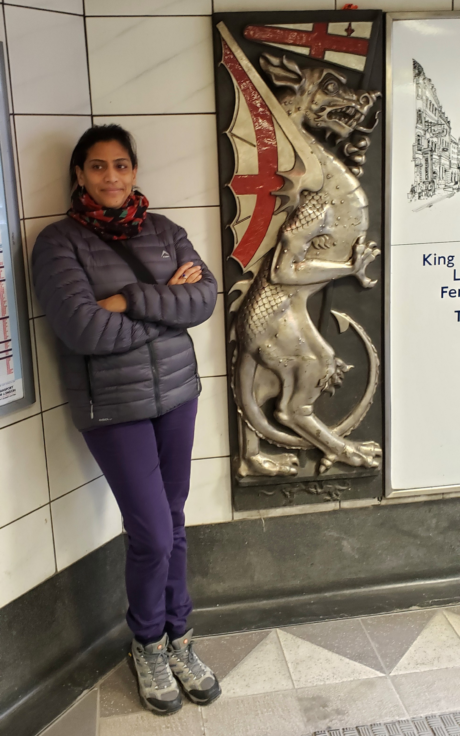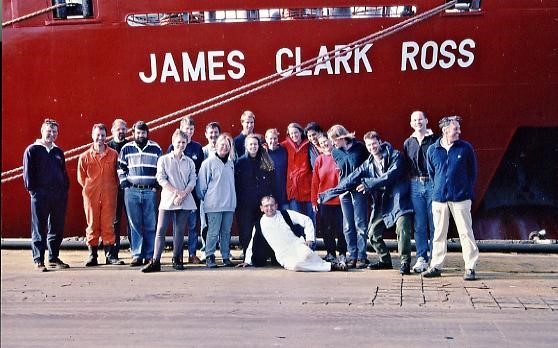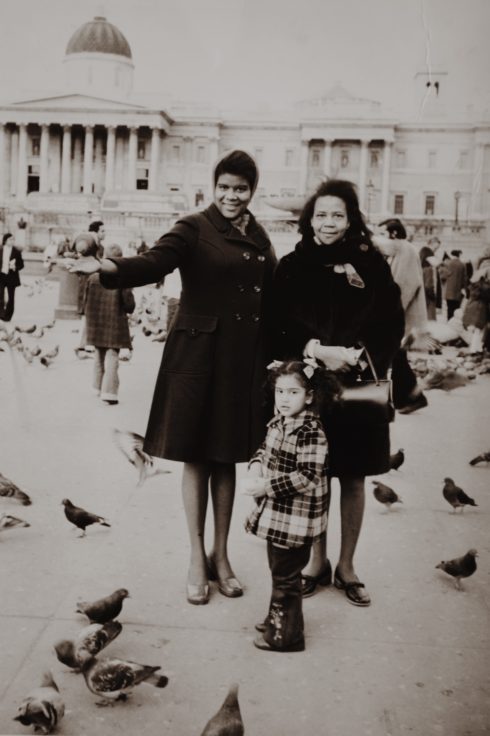Small islands in the middle of nowhere
15 October, 2020 Diversity in UK Polar Science
Sharon Grant spent five years working as a Numerical Marine Ecologist at British Antarctic Survey from 1997-2002. To celebrate Black History Month this October, she describes her experiences of working in polar science in this guest blog, which forms part of a series of activities for the Diversity in UK Polar Science Initiative.
Why me? Why Now?
Honestly, when they asked me to write about my time in the Antarctic I wasn’t especially inclined to do so. Really? After more than 20 years? It took a pandemic. More than a million deaths; globally coordinated civil unrest and a call for equity, equality and justice for all humans regardless of creed, colour, orientation or happenstance of birth. Now someone is interested in my story? Geez. Talk about a token.
So I called my Mum 8,000 miles away and whinged. To be fair, I was still pretty shaken up from having been under nightly curfew for a week. Protests over the murder of George Floyd had evolved and descended into nights of incandescent rage, despair and maleficence. Illinois, Chicago and my sleepy town of Oak Park locked down harder and tighter than a Scottish scallop harassed by a starfish. When we emerged, I cried when I saw white people, I cried when I saw black people and a police car made me freeze in my tracks. So I whined. She listened. Then she said:
“If after all that you don’t tell your story now, then you probably won’t get another chance and you can’t moan that no one ever asked you to do it.”
As always, she told me what I didn’t want to hear. She made me think. She made me do. I remembered another moment on a trip South where I had been told to do a thing I did not want to by someone wiser than me. I was younger so I had sulked. I had done my job as well as I could, albeit with an inward lack of grace. My reward for sucking it up and doing the right thing? A once in a million lifetime sauna in a sunken caldera. Sometimes you have to give in and do as you are told to get the reward. People and circumstances wiser than me are telling me to do a thing, so here I am doing “a thing”.

I guess we’re doing this?
A few nights before I left for my first trip to Antarctica, my Godfather and I watched “Alive” on the telly at my Gran’s house. There was a plane, a crash, snow, ice and a bunch of blokes eating each other. My Gran, a seasoned traveller herself, was not especially impressed with the film or my destination. My large and wonderful Jamaican family were supportive as always of my meanderings around the globe. Mostly however, they were just plain confused as to what I was actually getting paid to do and definitely baffled as to why I would want to “Go to that cold place” in the middle of nowhere.
I didn’t know then that not being able to convey how deeply the Antarctic seeps into your being and is unexplainable, to anyone who hasn’t been there, was just how it was always going to be. My Stratford School, East End mates were also used to my random comings and goings. They made me mix-cds and wished me well. Their punishment for enjoying themselves too much without me was to endure endless 35 mm slideshows of white specks on blue backgrounds. They put up with me then and still do to this day, though thankfully the photographs are of significantly higher quality – thank you digital.
How did I get here? And where is here anyway?
To be honest I wasn’t even supposed to be going. I was a Numerical Marine Ecologist. As part of the Ecosystems Team I was supposed to number crunch and manipulate data. None of that involved a season South, but my officemate, the data manager, couldn’t go. I wasn’t afraid of a computer so I filled the spot and was charged to do whatever the oceanographer told me to do. So here I was waiting for the coach to Brize Norton RAF airport, kitted out with a new HUGE travelling bag, a shiny new Pioneer CD player and a Pentax P3. The ultimate newbie. Only now looking back do I picture the only black person in the group heading out that day. What I do remember is being excited. We had spent months planning and packing and my Zarges box (#1 on the manifest) was already in a container in the Falkland Islands waiting for me on the quay at FIPASS beside a little red ship with penguins on the funnel. Can we go already!?
Due South…
Combing through the photographs of my trips, I was struck by how technology has changed the experience of travel and fieldwork. I have just over 1,000 slides and photographs from 5 years at BAS compared to the same number from a 14-day work trip to Vietnam in 2019. There is no instagram post of me opening presents watching reindeer on Christmas day at South Georgia and no TikTok video of the brave octopus that spent all night trying to escape its bucket prison. Only on its 5 am reprieve, to become breakfast for a Giant Petrel following the ship. For keeping in touch with family and friends, we had only two email “scheds” a day. No 24/7 connectivity and non-stop YouTube. Our senior staff thought this was insane and hankered for the good old days where you only got “real” letters when you docked in port. In these pandemic days, there is much yearning for the good old days and nostalgia for what was “normal”. Perhaps moving on and changing is actually ok? Perhaps there are things better left in the past?
It takes a village – especially at sea
I certainly wasn’t the only person of colour at BAS, a colleague of Indian origin was busy at work on the ice and another was keeping IT in order back at HQ. As a percentage though, we were certainly very few and far between. I am saddened that my shipboard experience of respect for hard work and expertise seems to still be the exception rather than the norm for women in science. Perhaps this was because of the senior researchers who were teachers and mentors from a less cut-throat era and veterans of a previous time. I also think that the cohort of women that I was privileged to have as my science colleagues on the RRS James Clark Ross were especially talented and were outside on deck alongside their male counterparts no matter what. We worked hard to earn the respect of one another, the science team and the ship’s officers and crew: without whom our research would not have been possible and our parties much less colourful.

It took an apocalypse to ask
Since the lockdown in March I have been working from home. I still have my job, and I am paid. It’s nice. I have a window and a balcony. The academic community has moved itself online and this certainly hasn’t reduced the amount of time we spend together. My calendar is stuffed with Zoom conferences and working groups, and Slack is the new “Hey look what I found/learned/heard” coffee room replacement. In the in-between moments, when there is time to stop and think, I wonder how things will change? Access to technology and information is a big factor but it isn’t free. If you can’t afford it how do you keep up, let alone excel?
The other thing that has moved into the virtual world is my Mum’s quadrille dance class. Once a week this group of West Indian seniors who can no longer twirl in their formations around a room together have been gathering to talk. They are worried for their children and grandchildren and they are angry. They had moved halfway around the world to make it better and still they see their people suffering. I join them when I can to show them that success for their children is possible. Their hard work to teach me that I was valued and valuable as I grew up paid off. I believe this is the key – it costs nothing to be encouraging and inclusive.
So, thank-you for asking…
Here’s to the Grant women “Wha di goat duh, di kid fallah”. Thank you for my heritage and the matriarchy that taught me I could go anywhere and have your small tropical island near my heart to keep me warm.

Small Islands
“‘We leave our pleasant homelands,
for the roaring south east winds,
all words of love and friendship,
for yearning hearts and minds,
for clasps of loving fingers,
dreams must alone’” Ernest Shackleton –
Sharon Grant works as Director of Information Systems at The Field Museum of Natural History, in Chicago, IL USA. She is part of a team of 12 amazing technologists working to keep the Museums’ infrastructure functioning seamlessly to support its staff, and the EMu-clan who strive to preserve and share the Museum’s digital legacy.